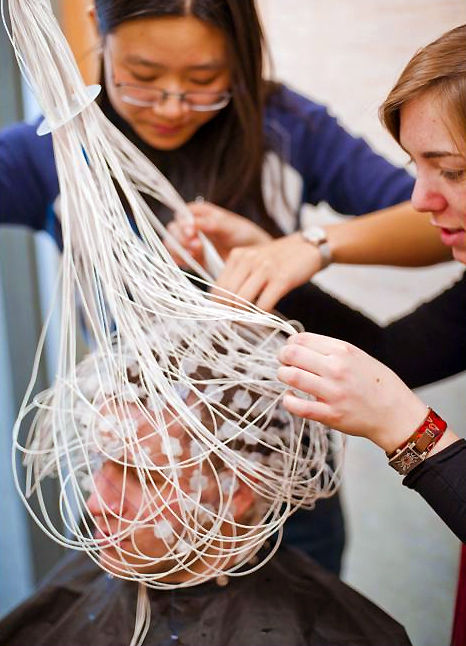
Students manipulate an older model of the electroencephalography (EEG) system.
Several faculty members recently were awarded a major National Science Foundation (NSF) grant that will allow for interdisciplinary cooperation between the Department of Psychology and Neuroscience Program and provide students access to equipment usually not found in undergraduate research facilities.
Professors Bruce Hansen, Arnold Ho, Spencer Kelly, Carrie Keating, and Doug Johnson jointly applied for the grant through the NSF’s Major Research Instrumentation (MRI) program to obtain a state-of-the-art electroencephalography (EEG) system for use by faculty and students studying psychology and neuroscience.
The EEG system, which consists of electrodes that are placed on a person’s scalp, records brain waves. The system will integrate existing lines of behavioral research with neuroscience research measuring neuroelectric brain activation.
Hansen, associate professor of psychology, spearheaded the grant proposal.
“Having a shared EEG system will provide a common tool connecting a diverse range of department members and will facilitate both intradisciplinary and interdisciplinary work among researchers at °Ä˛ĘżŞ˝± that may not otherwise collaborate,” Hansen said.
Hansen believes this integrated approach will allow faculty members to directly engage students with laboratory techniques that unite psychology and neuroscience into one field of study. This method will, in turn, foster nontraditional research connections that should spark fresh insights and create new areas of study.
“The EEG system also will give our students access to a research environment that is uncommon at the undergraduate level,” Hansen explained. “That is, students in our labs will actually be using the EEG system, opposed to only observing the system when in use.”
Professors already are seeing the potential for using the instrument in their respective research and are making plans to implement the state-of-the-art equipment.
Ho, an assistant professor of psychology, plans to use the instrument to enhance his research, which connects patterns of brain activity to behavioral tendencies.
“This technology should enrich my current program of research on the psychology of inequality and prejudice,” said Ho. “One of my main areas of research concerns how we categorize and perceive individuals belonging to multiple groups, such as [biracial individuals.] The EEG system will enable me to explore the neural underpinnings of such patterns of categorization and promises to reveal why we may exhibit biases in our perception of [individuals who belong to multiple ethnic groups].
“The enhancements to my research program allowed by this grant should directly benefit °Ä˛ĘżŞ˝± students who conduct research in my lab,” added Ho.